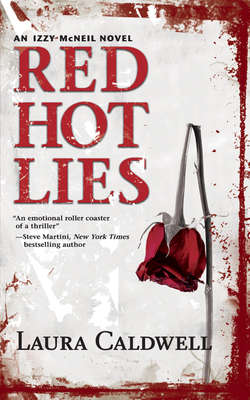Читать книгу Red Hot Lies - Laura Caldwell, Leslie S. Klinger - Страница 9
2
ОглавлениеThe funny thing—although maybe funny isn’t the right word—is that I already knew a single day could slap you around and send you reeling. I’d had such a day twenty-one years ago when my father died. It was Tuesday, and it was gloriously sunny and clear—I always remember the weather first—and Charlie and I were playing in the leaves in the backyard, making painstakingly neat piles, which we would dive into with a yelp and destroy in an instant.
My mother came out of the house. She was wearing jeans with a brown braided belt that tied at the waist, the ends of which slapped her thighs as she walked. Her red-blond hair was loosely curled around her face, as usual, but that face was splotched and somehow off-kilter, as if it had two different sides, like one of those Picasso paintings my teacher showed us in art class.
She sat us down on the scattered leaves and told us he was gone. He had been on a solo flight, training for his helicopter license when the helicopter experienced mechanical trouble and went down over Lake Erie. My father was a psychologist and a police profiler, but my mother would later tell us that he was always learning new skills. And now he was dead. It was as simple, and awful, as that.
Charlie seemed to take the news well. He furrowed his tiny brow, the way he did in school in order to avoid accusations of not paying attention. He nodded at her. He was six then, two years younger than me, and I could tell he didn’t understand, or at least he didn’t grasp the gravity of the situation. It was a trait Charlie would carry all his life.
After my mom and Charlie went inside, I raked the scattered leaves into neat piles and left them that way.
We moved from the small log house in Michigan to an apartment on the north side of Chicago, where my mother knew a few distant family members. We changed our wide swath of lawn for a concrete sidewalk. The air we breathed no longer smelled of pine or lake water, but of bus fumes and sometimes, when the wind was right, dark cocoa from the chocolate factory a few blocks away.
My mother, who had been a local radio DJ in Michigan, got some help from her boss, who found her a job as a traffic reporter. Every day, she ironically boarded a helicopter and floated above a city she hadn’t known since childhood, telling people about the congestion on the Dan Ryan Expressway, the gridlock on the Northwest Tollway.
Sometimes at my new school, I would stare out the classroom window and into the sky, imagining her flying around up there, like an angel. My mother had taken on angelic properties, too. She was thin—so thin I sometimes imagined I could see her veins and muscles right through the translucent shell of her skin. She rarely played with us anymore. She never laughed. I thought she was probably thinking of my father, of his messy brown hair and mischievous eyes that made him look as if he was about to crack up, despite his serious round glasses.
I thought I’d grown up that day, sitting on those leaves. My mother would tell people afterward that I was an “old soul,” a comment I took as the highest of compliments and a quality I worked hard to cultivate. It wasn’t difficult given the fact that I had taken on many of my mother’s duties. Every morning, I toasted two slices of bread, just like she used to. Every morning, I smeared them with peanut butter, and then, very carefully, striped the middle of the bread with a column of strawberry jam, just like my mother had when we were in Michigan. I would coax Charlie from bed and make him sit in the kitchen, where we would eat our toast, just like we used to.
And then one day, my mother came back, at least for a while. She smiled again, she had gained a little weight, she laughed when Charlie spilled chocolate milk on the couch.
As I got older, I felt stronger for having lost my dad at a young age. There was a certain relief in having experienced that loss, because I knew what pain was like; I knew I could survive. I laugh now when I think of that. The fact was I was only eight—old enough to be nearly destroyed, yet resilient enough to see no alternative but to march forward.
I’m not eight anymore, and the truth is, I grew lighter over the years. Maybe the old soul was still there, a piece of me that watched over my life, but my life had become fun again; I found friends with whom I could be silly and revel in it. Eventually, I found Sam, who had brought me so much joy. And then came that Tuesday—another autumn Tuesday—when the plates of my world screeched and shifted.
